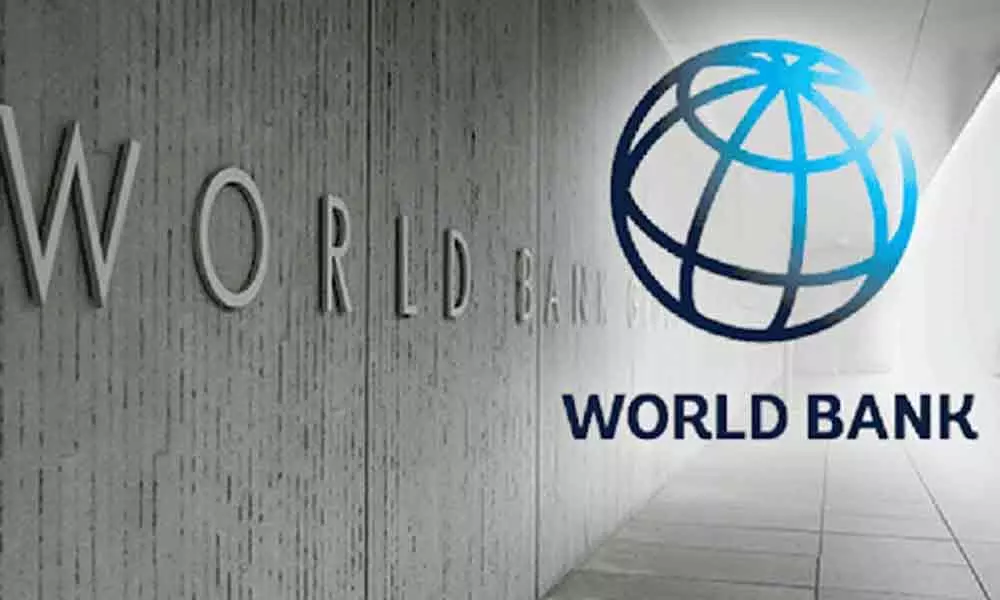World Bank sees bigger dent to India's GDP

World Bank
The World Bank on Wednesday indicated that it may further lower its growth projections for India and said critical reforms in key areas such as health, labour, land, skills and finance are needed to come out stronger from the Covid-19 crisis.
New Delhi: The World Bank on Wednesday indicated that it may further lower its growth projections for India and said critical reforms in key areas such as health, labour, land, skills and finance are needed to come out stronger from the Covid-19 crisis.
The World Bank had in May projected that the Indian economy will contract by 3.2 per cent in FY21 and rebound slowly in the next financial year.
"Further challenges have emerged in recent weeks which are likely to weigh on the prospects in the near term. These risks include the virus continuing to spread; further deterioration in the global outlook; and additional strains projected on the financial sector. Keeping these factors in mind, a steeper contraction may be projected in the revised outlook that will be available in October 2020," it said in its India Development Update released on Wednesday.
It projected India's fiscal deficit to rise to 6.6 per cent of GDP in FY21 and remain elevated at 5.5 per cent in the following year. "The pandemic has afflicted India at a time when its economy had already been decelerating," the World Bank said. Defying a long-term accelerating path, real GDP growth moderated from 7.0 per cent in 2017-18 to 6.1 per cent in 2018-19 and 4.2 per cent in 2019-20.
"The pre-Covid-19 growth deceleration was perceived to be due to long-standing structural rigidities in key input markets; continuing balance sheet stress in the banking and corporate sector, which was compounded more recently by stress in the non-banking segment of the financial sector; increased risk aversion among banks and corporates; a decline in rural demand; and a subdued global economy," it said.
While India took several policy actions, including a reduction in the corporate tax rate, regulatory forbearances for small business, reduction in personal income tax rates and business regulatory reforms, the pandemic cut short any hope that these actions would yield the expected payoffs.
"The outlook has now changed substantially, and the economy will likely contract in the current fiscal year," it said. The economic impact of the pandemic will be felt in a direct decline in domestic demand and supply disruptions triggered by the containment measures, resulting in near collapse in certain service activities such as trade, transport, tourism and travel.
Also, there would be a second round of consumption and investment slowdown, compounded by (and ultimately driving) distress in the financial sector and financial markets, it said. "India needs to continue to implement critical reforms in key areas such as health, labour, land, skills and finance to come out stronger from the impact of the Covid-19 pandemic. These reforms should aim at enhancing the productivity of the Indian economy and spur private investments and exports," the World Bank report said.
Besides the immediate relief and recovery measures, the government has announced significant reform measures for agriculture, education, public sector, and micro, small and medium enterprises. The report says furthering such reforms will help put the economy back on a 7 per cent growth path.
The India Development Update is a biannual flagship publication of the World Bank that takes stock of the Indian economy.
"While the Government of India, with the support of the Reserve Bank, is continuing to take action to limit the impact of the Covid-19 pandemic, there is a recognition of both the uncertainty of the nature of the economic revival globally and the emergence of opportunities opened by the current crisis," said Junaid Ahmad, World Bank Country Director in India. "Countries that invest in sectoral reforms - infrastructure, labour and land, human capital - and ensure that their national systems are connected to the Global Value Chains, are more able to respond to uncertainties and are better placed to take advantage of any global shifts. Investing in these areas will give India the ability to navigate these uncertainties and be more competitive as the world emerges from the pandemic," he said.
To strengthen fiscal reforms, the report suggested reassessing subsidies to leverage any scope for efficiency gains, generating non-tax revenues more aggressively and linking the repayment of new borrowings to disinvestment receipts.
To put the financial sector on a sounder footing, the report identifies specific areas of reform, including in the non-banking finance company (NBFC) sector, deeper capital market reforms, mainstreaming fintech to reach firms faster and at a lower cost, and moving to a more strategic public sector footprint.








